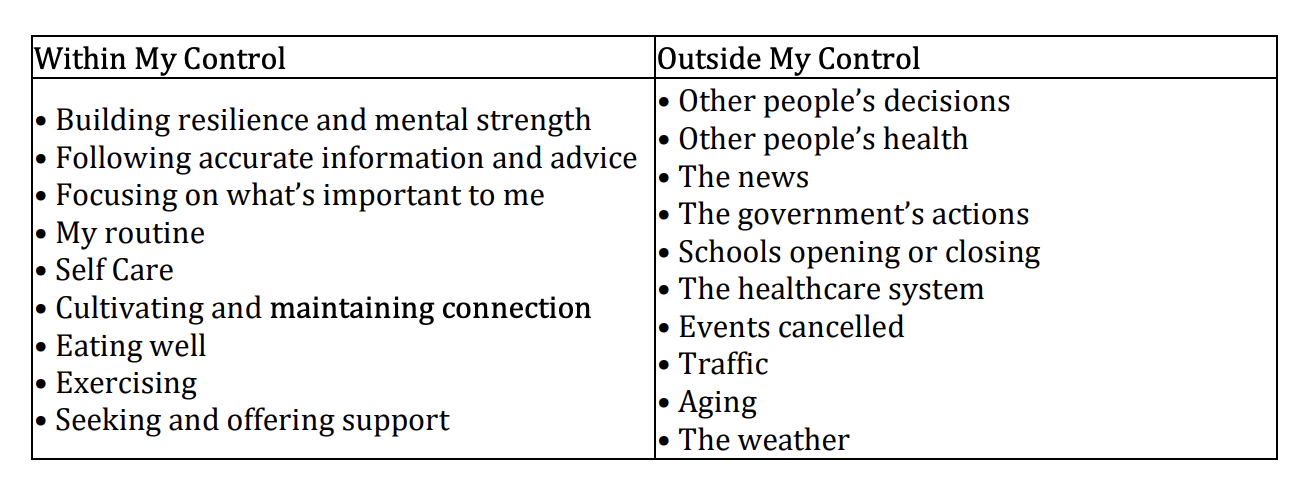Anxiety: the new, the old and how to manage it as we reopen our work and personal communities
– Willo Wisotsky, PhD
As we start to find our new normal and head back to routines that are reidentified, you may find yourself experiencing thoughts and sensations that feel a bit different for you.
The first thing to note right now is that it is completely normal to be experiencing a wide range of emotions. Accepting your feelings is an important first step to building resilience, mental strength and feeling calmer. The simple act of naming your emotions (something we all learned in kindergarten ☺) has been found to benefit our wellbeing. Take a moment now to tune into your mind/body and notice how you are feeling. Name the emotion….
- Anxious
- Stressed
- Worried
- Fearful
- Excited
- Lonely
- Overwhelmed
- Frustrated
- Guilty
- Angry
Anxiety is best described as the unhelpful thinking patterns we experience when our mind preoccupies on threat, uncertainty, and negativity. Anxiety can occur on its own, as a response to stress, or it can trigger stress. It is important to understand that you cannot control anxiety from occurring, you can although control how you interpret and respond. Learning how to respond to anxiety productively, will aid you so that you do not get overwhelmed or knocked down by it.
Here are some anxiety thought process examples of what to look out for:
Threat Scanning: When your mind searches the environment for what you fear (consciously or subconsciously). This is quite common right now. Threat scanning is often associated with your mind giving meaning to harmless events.
- Frequently checking your body for coronavirus symptoms.
- Obsessively checking social media and the news for coronavirus updates
Fortune Telling: When your mind interprets predictions as facts.
- “I’m going to be scared forever about COVID-19.”
- “My mental health will keep deteriorating and I won’t be able to work ever.”
Emotional Reasoning: When your mind tells you that all your emotions reflect reality. While emotions can be useful, consistent reliability is not always dependent on our interpretation.
- “I feel scared, so I must be in danger.”
- “I feel guilty, so I must have done something wrong.”
Catastrophizing: When your mind jumps to worst-case scenarios, i.e., ‘I will be in danger if I leave my home’
- You feel respiratory heaviness and your mind tells you that you have coronavirus and that your life is in danger.
- Your mind gives you the mental image of hospitalizations and/or losing all the people you love.
If you are prone to catastrophizing, you may find it helpful to redirect your attention to the facts: List what you know are the facts of COVID-19 and the advice to stay healthy.

Hypothetical vs. Practical Worry: Hypothetical worries include ‘what if’ thoughts that are generally about situations/events you do not have much control over. Practical worries include situations/events you do have control over. Practical worries can help you be more proactive (i.e. ‘I can get in an accident if I run the red light’). It is important to mindfully understand that worry is completely normal. It only becomes unhelpful when you focus excessively on hypothetical worries instead of practical worries. You cannot stop hypothetical worries from occurring, but you can control your response to them. Shift your thoughts on what you can control.
- “I know I’m following all the guidelines, but what if I spread the virus?”
- “What if someone gets too close to me at the supermarket and I catch it?”

The ABCDE Technique- to aid in anxiety reduction
Attention – When you feel distressed, stop what you are doing and pay attention to your internal dialogue. What is your mind and body telling you?
Believe – Do not automatically believe your thoughts!
Challenge – Diffuse anxiety by expanding your focus. What is the bigger picture? Is the thought fact or opinion? Is this within or outside my control? What might you think if you were feeling emotionally and physically calmer?
Discount – Acknowledge that anxiety has been dominating your thinking and let the unhelpful thoughts go. Write down what thoughts are helpful and what thoughts are not.
Explore options – What would be helpful to focus on right now? What opportunities do I have available to me physically and emotionally?
“You have power over your mind, not outside events. Realize this and you will find strength.”
– Marcus Aurelius









